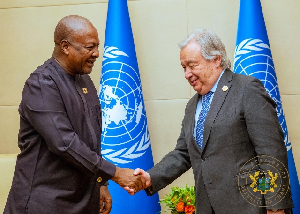The Plan of Development for the TEN project which includes the collective development of three hydrocarbon accumulations -- Tweneboa, Enyenra (formerly Owo) and Ntomme - is under review at the Ministry of Energy and Petroleum, and the outcome will be made public in due course, the Director of Petroleum at the ministry Dr. Paul Frimpong has said.
In an interview with the B&FT, Dr. Frimpong said the review is done in “parallel” with the involvement of the Petroleum Commission and Ghana National Petroleum Corporation (GNPC).
In its 2012 results released on Wednesday, February 13, 2013, Tullow Oil indicated that it had made good progress on the Development Plan for the TEN Project, which culminated in the Declaration of Commerciality and the Plan of Development (PoD) being submitted to the Minister of Energy in November 2012.
It added that it had submitted a Plan of Development (PoD) to the Minister of Energy and that “approval of the PoD is expected in the near-future”.
Tullow pegged the current estimated capital expenditure cost for the base development plant of the project, which includes around 23 injection and production wells and excludes FPSO lease costs, at around US$4.5billion.
The three oil and gas fields -- Tweneboa, Enyenra and Ntomme -- are part of the Deepwater Tano licence located offshore Ghana.
The fields lie in water depths of 1,000m to 2,000m. The development is located 25km away from the Tullow-operated Jubilee Field. It is the first deepwater field to be developed offshore Ghana.
First production is expected in the first quarter of 2015 and a peak production rate of 100,000 barrels of oil per day is expected by 2018. The project is expected to recover approximately 216 million barrels of oil.
The company said as at 31 December 2012 it had transferred 112 million barrels of oil equivalent (mmboe) from contingent resources to commercial reserves in respect to the Tweneboa-Enyenra-Ntomme (TEN) development.
The TEN appraisal programme started in January 2011 and continued in 2012 with the drilling of three wells. The Owo-1RA well was drilled and successfully tested in January 2012 at combined rates in excess of 20,000 bopd.
Enyenra-4A was drilled in March 2012, intersecting 32 metres of oil-pay. Water injection tests on this down-dip well were carried out in April 2012, with results proving that the Enyenra channel sands are suitable for water injection to support oil production.
The Ntomme-2A well was drilled in January 2012 and “found oil (the Ntomme discovery well) down-dip of the Tweneboa-3ST non-associated gas discovery”. The well was production-tested in May 2012 at combined flow rates in excess of 20,000 bopd, confirming excellent quality reservoir.
Tullow said an FPSO design competition has been completed and that bids have been received from two contractors and are being evaluated. “A contract award will take place in early 2013, subject to PoD approval. The sub-sea FEED is now complete.”
Tullow Oil is the operator of the Deepwater Tano licence and holds a 49.95 percent interest. Partners include Kosmos Energy (18 percent), Anadarko Petroleum (18 percent), Sabre (4.05 percent) and the Ghana National Petroleum Corporation (GNPC, 10 percent).
Tullow has interests in two licences offshore Ghana: Deepwater Tano and West Cape Three Points, with the Jubilee Field straddling both licence areas.
Business News of Saturday, 23 February 2013
Source: B&FT












